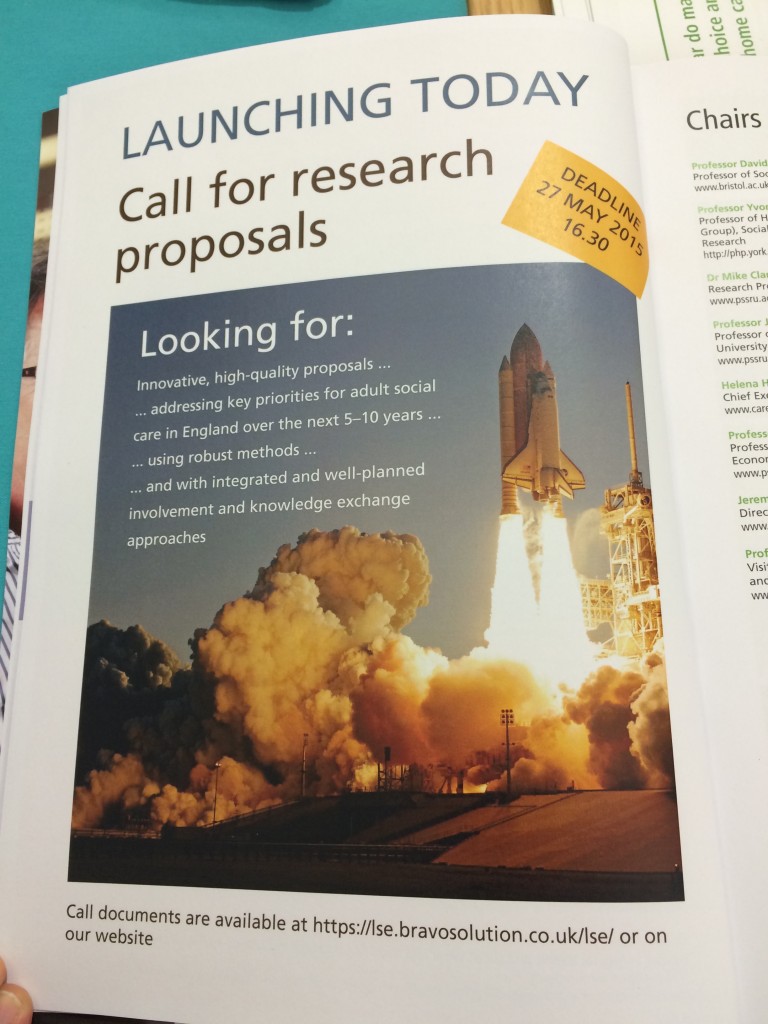Consider impact early
There is a recurring theme in the posts on this blog that relates to planning, timing and impact activity. One of the six lessons highlighted from the SCEIP project was to plan, another was to consider your audience, yet another key message is around incorporating creative knowledge exchange methods into research proposals.
The common learning is that you can never consider impact too early in the research process.
A couple of weeks ago the NIHR School for Social Care Research issued a Call for Proposals. Charged with growing the evidence base for adult social care practice in England, there is much to be done to make a positive impact.
This post will highlight how this website, and the tools and ideas within it, might support a research proposal.
1) Consider what impact means to you
It may be that the type of impact your research in social care could have is far broader than you’d initially considered. Visit the ‘What is impact‘ section to explore this further. The temptation can be to consider ‘impact’ to be academic impact, as defined by REF, or perhaps also to consider social impact in terms of health and well-being, but there are far more areas in which social care impact can happen including economic, political and legal domains.
2) Identify who your stakeholders are
This may seem obvious, but often this stage appears to be skipped. We think we know who are our stakeholders are, sure they include funders, research participants, colleagues, but if we really want our research to have impact then it’s good to consider who else we might inform or involve. No research happens in a vacuum, so take some time out to consider who could support your research to have impact, map your stakeholders and always consider this before you start, not just at the end when you want to distribute findings!
3) Develop your research ideas
Try to keep your thinking open in the early stages of developing ideas, you can narrow them at the next stage, but initially when developing ideas try to think big. Consider what you already know from previous research work, you’d be hard pressed to find a research report that doesn’t end with the statement that ‘more research is required’, but perhaps more importantly talk and listen to people who use social care to identify their priorities. If we truly want our research to have an impact on social care then we need to understand how it will be used by those accessing or providing social care. There are a number of ways in which you can gather this input (check them here), you could hold an unconference or have a brainstorm over coffee and cake. However you form your ideas we believe that the investment early on will pay dividends to the quality of your proposal and potential impact of your work.
4) Refine your ideas
Once you have a pool of research ideas, and a map of your key stakeholders, make some time to consider the two together and refine your ideas. You can do this alone, as a project team, or publicly with some of the stakeholders you’ve identified. You could also refine your ideas in public, offering your thinking aloud via social media e.g. you could write a blog or tweet your ideas and ask readers to identify their priorities. Consider using the RATWOE approach to streamlining your options.
5) Be ambitious!
When it comes to writing your research proposal, the key thing is to be ambitious! Consider the input stakeholders have provided throughout, reflect on what has worked well, what has created impact in the process so far and write those methods into your research proposal. Funders repeatedly told us during the SCEIP project that creative methods for knowledge exchange and impact activity would be funded if costed at proposal stage; reluctance sets in when researchers return for more money later in the research process due to initial poor planning.
When submitting a proposal researchers have a golden opportunity to consider what methods they can use early on, to understand the resource implications, consider the barriers and enablers to the methods and what you can do to mitigate or support them. We hope that the descriptions of the tools and methods detailed on this site will help you in this process; you can focus on impact methods alone, consider the tools for managing impact, or view the stages your research is likely to take and see what methods work at what points.
We must move past the days of impact being considered at the end of a research project, if we wish to truly improve social care practice then we need to consider impact and research together, at every stage of the research process.
